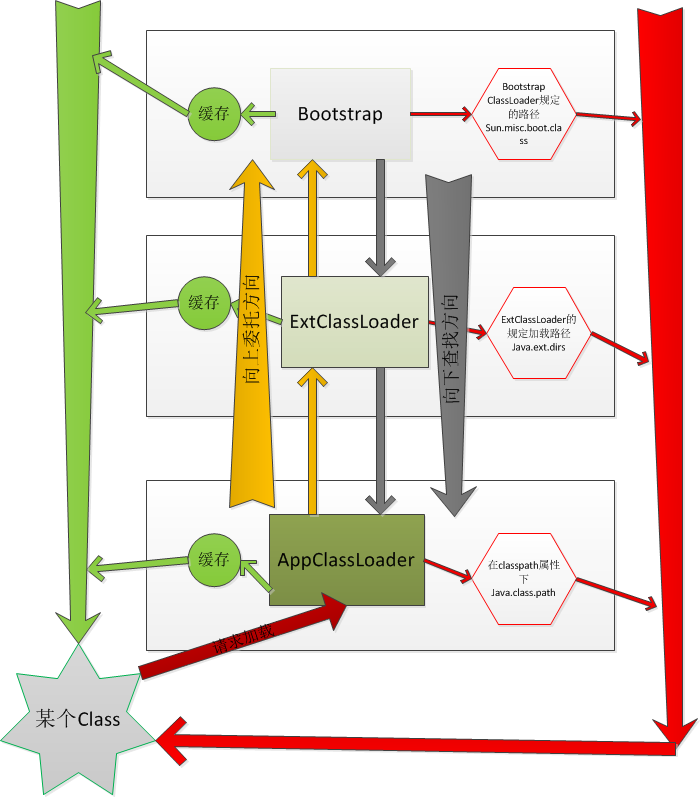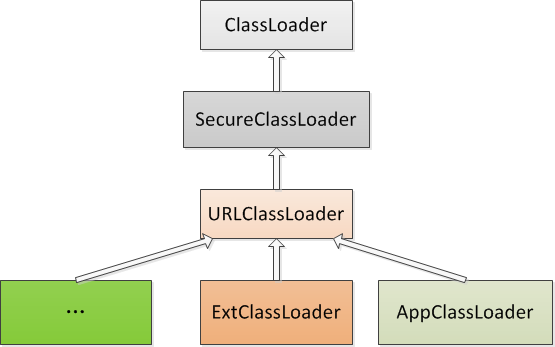标签:call path sources source xtu 默认 etl 两种 gets
? ClassLoader的具体作用就是将class文件加载到jvm虚拟机中去,程序就可以正确运行了。但是,jvm启动的时候,并不会一次性加载所有的jar包从而导致内存崩溃。
? java语言系统自带有三个类加载器:
? Bootstrap ClassLoader最顶层的加载类,主要加载核心类库,如%JRE_HOME%\lib下的rt.jar,resources.jar,charsets.jar和class等。另外可以通过启动jvm时指定-Xbootclasspath和路径来改变Bootstrap ClassLoader的加载目录。如Java -Xbootclasspath /a:path被指定的文件追加到默认的bootstrap路径中。Bootstrap ClassLoader由C/C++开发,是JVM虚拟机的一部分,本身不是Java类。
? Extention ClassLoader扩展的类加载器,加载目录%JRE_HOME%\lib\ext目录下的jar包和class文件。还可以加载-D java.ext.dirs选择指定的目录。
? APPclassLoader也称为SystemAppClass加载当前应用的classpath的所有类。
BootStrap Classloader > ExtClassLoader > AppClassLoader
? sun.misc.Launcher,它是一个Java虚拟机的入口应用。
public class Launcher {
private static Launcher launcher = new Launcher();
private static String bootClassPath =
System.getProperty("sun.boot.class.path");
public static Launcher getLauncher() {
return launcher;
}
private ClassLoader loader;
public Launcher() {
// Create the extension class loader
ClassLoader extcl;
try {
extcl = ExtClassLoader.getExtClassLoader();
} catch (IOException e) {
throw new InternalError(
"Could not create extension class loader", e);
}
// Now create the class loader to use to launch the application
try {
loader = AppClassLoader.getAppClassLoader(extcl);
} catch (IOException e) {
throw new InternalError(
"Could not create application class loader", e);
}
//设置AppClassLoader为线程上下文类加载器,这个文章后面部分讲解
Thread.currentThread().setContextClassLoader(loader);
}
/*
* Returns the class loader used to launch the main application.
*/
public ClassLoader getClassLoader() {
return loader;
}
/*
* The class loader used for loading installed extensions.
*/
static class ExtClassLoader extends URLClassLoader {}
/**
* The class loader used for loading from java.class.path.
* runs in a restricted security context.
*/
static class AppClassLoader extends URLClassLoader {}
? 我们可以从源码中得到两个信息
? 1.Launcher初始化了ExClassLoader和AppClassLoader
? 2.Launcher中并没有看见BootstrapClassLoader,但通过System.getProperty("sun.boot.class.path")得到了字符串bootClassPath,这便是BootstrapClassLoader加载的jar包路径。
? ExtClassLoader源码
/*
* The class loader used for loading installed extensions.
*/
static class ExtClassLoader extends URLClassLoader {
static {
ClassLoader.registerAsParallelCapable();
}
/**
* create an ExtClassLoader. The ExtClassLoader is created
* within a context that limits which files it can read
*/
public static ExtClassLoader getExtClassLoader() throws IOException
{
final File[] dirs = getExtDirs();
try {
// Prior implementations of this doPrivileged() block supplied
// aa synthesized ACC via a call to the private method
// ExtClassLoader.getContext().
return AccessController.doPrivileged(
new PrivilegedExceptionAction<ExtClassLoader>() {
public ExtClassLoader run() throws IOException {
int len = dirs.length;
for (int i = 0; i < len; i++) {
MetaIndex.registerDirectory(dirs[i]);
}
return new ExtClassLoader(dirs);
}
});
} catch (java.security.PrivilegedActionException e) {
throw (IOException) e.getException();
}
}
private static File[] getExtDirs() {
String s = System.getProperty("java.ext.dirs");
File[] dirs;
if (s != null) {
StringTokenizer st =
new StringTokenizer(s, File.pathSeparator);
int count = st.countTokens();
dirs = new File[count];
for (int i = 0; i < count; i++) {
dirs[i] = new File(st.nextToken());
}
} else {
dirs = new File[0];
}
return dirs;
}
......
}
AppClassLoader源码
/**
* The class loader used for loading from java.class.path.
* runs in a restricted security context.
*/
static class AppClassLoader extends URLClassLoader {
public static ClassLoader getAppClassLoader(final ClassLoader extcl)
throws IOException
{
final String s = System.getProperty("java.class.path");
final File[] path = (s == null) ? new File[0] : getClassPath(s);
return AccessController.doPrivileged(
new PrivilegedAction<AppClassLoader>() {
public AppClassLoader run() {
URL[] urls =
(s == null) ? new URL[0] : pathToURLs(path);
return new AppClassLoader(urls, extcl);
}
});
}
......
}

? 每一个加载器都会有自己的缓存。当某一个类需要加载时,依次查看APPClassLoader,ExtClassLoader,BootStrap ClassLoader下的缓存是否加载过。如果没有没有加载过,便依次从BootStrap ClassLoader,ExtClassLoader,APPClassLoader规定下的目录加载类,如果存在类便返回并停止下一步操作。
? 保证JAVA定义的类不会被用户定义的类覆盖。
? 父加载器不是父类,ExtClassLoader与AppClassLoader都继承于URLClassLoader。
static class ExtClassLoader extends URLClassLoader {}
static class AppClassLoader extends URLClassLoader {}

? 调用AppClassLoader的getParent()方法会得到ExtClassLoader的实例,URLClassLoader源码中并没有getParent()方法。这个方法在ClassLoader.java中。
public abstract class ClassLoader {
// The parent class loader for delegation
// Note: VM hardcoded the offset of this field, thus all new fields
// must be added *after* it.
private final ClassLoader parent;
// The class loader for the system
// @GuardedBy("ClassLoader.class")
private static ClassLoader scl;
private ClassLoader(Void unused, ClassLoader parent) {
this.parent = parent;
...
}
protected ClassLoader(ClassLoader parent) {
this(checkCreateClassLoader(), parent);
}
protected ClassLoader() {
this(checkCreateClassLoader(), getSystemClassLoader());
}
public final ClassLoader getParent() {
if (parent == null)
return null;
return parent;
}
public static ClassLoader getSystemClassLoader() {
initSystemClassLoader();
if (scl == null) {
return null;
}
return scl;
}
private static synchronized void initSystemClassLoader() {
if (!sclSet) {
if (scl != null)
throw new IllegalStateException("recursive invocation");
sun.misc.Launcher l = sun.misc.Launcher.getLauncher();
if (l != null) {
Throwable oops = null;
//通过Launcher获取ClassLoader
scl = l.getClassLoader();
try {
scl = AccessController.doPrivileged(
new SystemClassLoaderAction(scl));
} catch (PrivilegedActionException pae) {
oops = pae.getCause();
if (oops instanceof InvocationTargetException) {
oops = oops.getCause();
}
}
if (oops != null) {
if (oops instanceof Error) {
throw (Error) oops;
} else {
// wrap the exception
throw new Error(oops);
}
}
}
sclSet = true;
}
}
}
? 我们可以看到getParent()实际上返回的就是一个·ClassLoader对象parent,parent的赋值是在ClassLoader对象的构造方法中,它有两种情况:
? 1.由外部类创建ClassLoader时直接指定一个ClassLoader为parent
? 2.由getSystemClassLoader()方法生成,也就是在sun.misc.Laucher通过getClassLoader()获取,也就是AppClassLoader。直白的说,一个ClassLoader创建时如果没有指定parent,那么它的parent默认就是AppClassLoader。
? ExtClassLoader与AppClassLoader的parent来源与Launcher类有关。
public class Launcher {
private static URLStreamHandlerFactory factory = new Factory();
private static Launcher launcher = new Launcher();
private static String bootClassPath =
System.getProperty("sun.boot.class.path");
public static Launcher getLauncher() {
return launcher;
}
private ClassLoader loader;
public Launcher() {
// Create the extension class loader
ClassLoader extcl;
try {
extcl = ExtClassLoader.getExtClassLoader();
} catch (IOException e) {
throw new InternalError(
"Could not create extension class loader", e);
}
// Now create the class loader to use to launch the application
try {
//将ExtClassLoader对象实例传递进去
loader = AppClassLoader.getAppClassLoader(extcl);
} catch (IOException e) {
throw new InternalError(
"Could not create application class loader", e);
}
public ClassLoader getClassLoader() {
return loader;
}
static class ExtClassLoader extends URLClassLoader {
/**
* create an ExtClassLoader. The ExtClassLoader is created
* within a context that limits which files it can read
*/
public static ExtClassLoader getExtClassLoader() throws IOException
{
final File[] dirs = getExtDirs();
try {
// Prior implementations of this doPrivileged() block supplied
// aa synthesized ACC via a call to the private method
// ExtClassLoader.getContext().
return AccessController.doPrivileged(
new PrivilegedExceptionAction<ExtClassLoader>() {
public ExtClassLoader run() throws IOException {
//ExtClassLoader在这里创建
return new ExtClassLoader(dirs);
}
});
} catch (java.security.PrivilegedActionException e) {
throw (IOException) e.getException();
}
}
/*
* Creates a new ExtClassLoader for the specified directories.
*/
public ExtClassLoader(File[] dirs) throws IOException {
super(getExtURLs(dirs), null, factory);
}
}
}
ClassLoader extcl;
extcl = ExtClassLoader.getExtClassLoader();
loader = AppClassLoader.getAppClassLoader(extcl);
? 如以上源码所示AppClassLoader的parent是一个ExtClassLoader实例。ExtClassLoader并没有直接找到对parent的赋值。他调用了他的父类也就是URLClassLoader的构造方法并传递了3个参数。
public ExtClassLoader(File[] dirs) throws IOException { super(getExtURLs(dirs), null, factory); }
public URLClassLoader(URL[] urls, ClassLoader parent, URLStreamHandlerFactory factory) { super(parent);}
Launcher 美 [?l??nt??r] 启动器;
bootstrap 美 [?but?str?p] 引导
[1]一看你就懂,超详细java中的ClassLoader详解 https://blog.csdn.net/briblue/article/details/54973413
[2]深入JVM理解Java类加载机制、类加载器、双亲委派模型、自定义类加载器 https://www.bilibili.com/video/BV18V411Y76a?p=2
标签:call path sources source xtu 默认 etl 两种 gets
原文地址:https://www.cnblogs.com/niehongyi/p/14961334.html